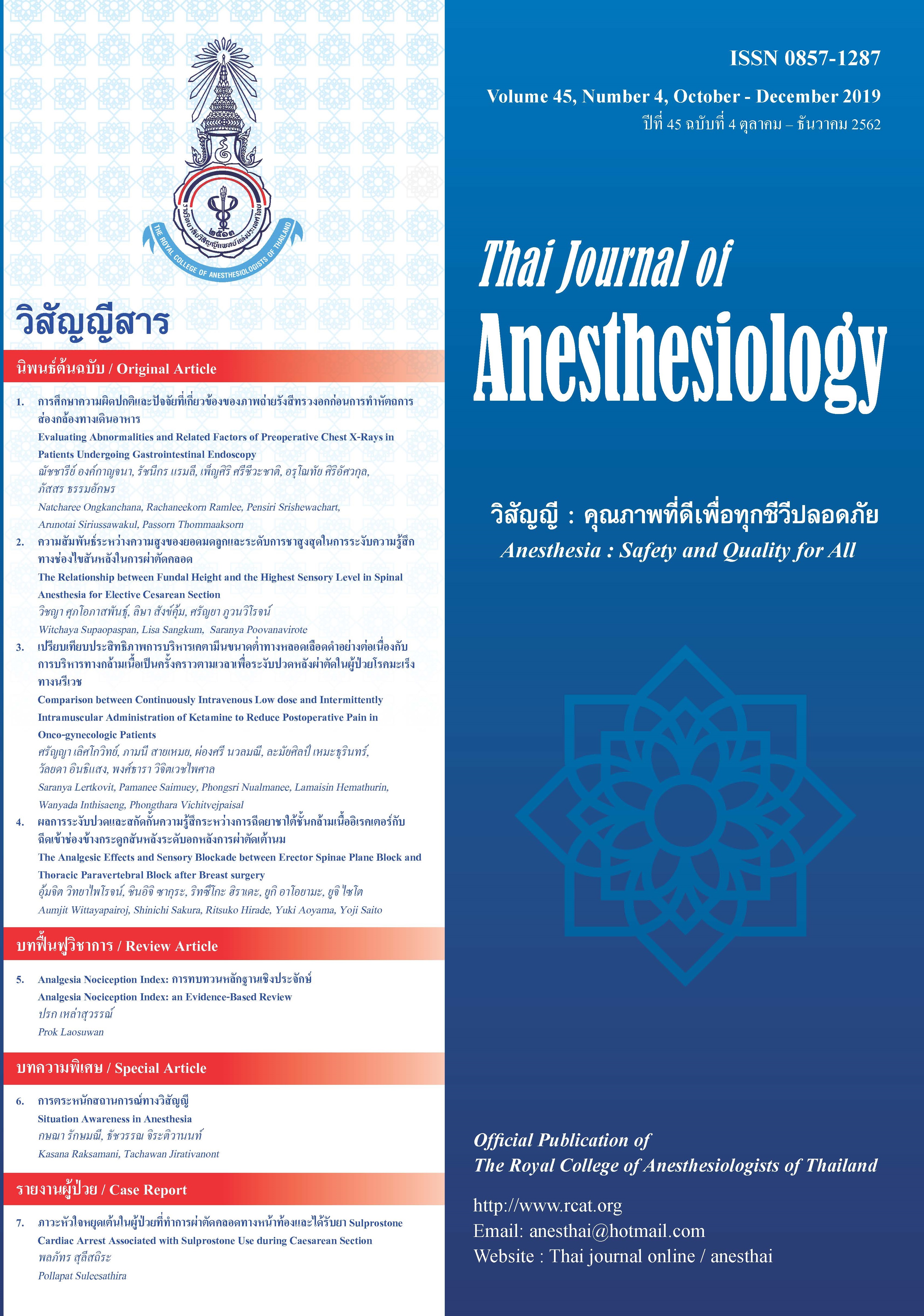Situation Awareness in Anesthesia
Main Article Content
Abstract
Situation awareness (SA) in anesthesia is a
foundation of non-technical skills contributed to effective
and safe patient care in anesthesia. SA is a cognitive
process that allows anesthetists to know the situation, the
environment and detect the anticipating problem while
providing anesthesia. By understanding these concepts
and improving individual and team SA, anesthetists could
prevent and early anticipating the critical incidences, hence
resulted in safer anesthesia. This review provided the
practical understanding of SA concepts for anesthesia
personnel, preventable errors from SA pitfalls, factors
affecting SA and how SA works at the team levels.
Article Details
Section
Special Articles
References
กษณา รักษมณี, ธัชวรรณ จิระติวานนท์, บรรณาธิการ.
Non-technical skills ส?ำหรับบุคลากรทางการแพทย์. กรุงเทพฯ:
บริษัทพีเอ ลีฟวิ่ง จ?ำกัด; 2562.
2. Raksamani K. Teaching non-Technical Skills in
Anesthesiology. Thai Journal of Anesthesiology. 2015;
41(1):47-52.
3. Fletcher G, Flin R, McGeorge P, Glavin R, Maran N, Patey
R. Anaesthetists’ Non-Technical Skills (ANTS): evaluation of
a behavioral marker system. Br J Anaesth 2003;90(5):580-8.
4. Endsley MR. Design and evaluation for situation awareness
enhancement. In : Proceedings of the Human Factors
Society 32nd Annual Meeting, Santa Monica, October24-28,
1988, p 97-101.
5. Gaba DM, Howard SK, Small SD. Situation awareness in
anesthesiology. Hum factors 1995;37(1):20-31.
6. Schulz CM, Krautheim V, Hackemann A, Kreuzer M, Kochs
EF, Wagner KJ. Situation awareness errors in anesthesia and
critical care in 200 cases of a critical incident reporting
system. BMC Anesthesiology 2016;16(1):4.
7. Schulz CM, Burden A, Posner KL, et al. Frequency and Type
of Situational Awareness Errors Contributing to Death and
Brain Damage : A Closed Claims Analysis. Anesthesiology
2017;127(2):326-37.
8. Atkinson RC, Shiffrin RM. Human memory: A proposed
system and its control processes. Psychology of learning
and motivation 1968; 2: 89-195.
9. Lutz S, Huitt W. Information processing and memory: Theory
and applications. Educational psychology interactive
[internet]. Valdosta, GA: Valdosta State University
2003;3(2):53 [cited 15th June 2019]. Available from: http://
www.edpsycinteractive.org/papers/infoproc.pdf
10. Endsley MR. Situation awareness in aviation systems. In:
Garland DJ, Wise JA, Hopkin VD. editors. Handbook of
aviation human factors. Ney York: CRC Press Taylor& Francis
Group; 1999: p 257-76.
11. Endsley MR, Robertson MM. Team situation awareness in
aviation maintenance. In : Proceedings of the Human Factors
and Ergonomics Society Annual Meeting; 1996. Los Angeles
CA: SAGE Publications; 40(21), 1077-81.
12. Schulz CM, Endsley MR, Kochs EF, Gelb AW, Wagner KJ.
Situation Awareness in Anesthesia Concept and Research.
Anesthesiology 2013;118(3):729-42.
13. Stanton NA, Stewart R, Harris D, et al. Distributed situation
awareness in dynamic systems: theoretical development and
application of an ergonomics methodology. Ergonomics
2006;49(12-13):1288-311.
14. Fioratou E, Flin R, Glavin R, Patey R. Beyond monitoring:
distributed situation awareness in anaesthesia. Br J Anaesth
2010;105(1):83-90.
Non-technical skills ส?ำหรับบุคลากรทางการแพทย์. กรุงเทพฯ:
บริษัทพีเอ ลีฟวิ่ง จ?ำกัด; 2562.
2. Raksamani K. Teaching non-Technical Skills in
Anesthesiology. Thai Journal of Anesthesiology. 2015;
41(1):47-52.
3. Fletcher G, Flin R, McGeorge P, Glavin R, Maran N, Patey
R. Anaesthetists’ Non-Technical Skills (ANTS): evaluation of
a behavioral marker system. Br J Anaesth 2003;90(5):580-8.
4. Endsley MR. Design and evaluation for situation awareness
enhancement. In : Proceedings of the Human Factors
Society 32nd Annual Meeting, Santa Monica, October24-28,
1988, p 97-101.
5. Gaba DM, Howard SK, Small SD. Situation awareness in
anesthesiology. Hum factors 1995;37(1):20-31.
6. Schulz CM, Krautheim V, Hackemann A, Kreuzer M, Kochs
EF, Wagner KJ. Situation awareness errors in anesthesia and
critical care in 200 cases of a critical incident reporting
system. BMC Anesthesiology 2016;16(1):4.
7. Schulz CM, Burden A, Posner KL, et al. Frequency and Type
of Situational Awareness Errors Contributing to Death and
Brain Damage : A Closed Claims Analysis. Anesthesiology
2017;127(2):326-37.
8. Atkinson RC, Shiffrin RM. Human memory: A proposed
system and its control processes. Psychology of learning
and motivation 1968; 2: 89-195.
9. Lutz S, Huitt W. Information processing and memory: Theory
and applications. Educational psychology interactive
[internet]. Valdosta, GA: Valdosta State University
2003;3(2):53 [cited 15th June 2019]. Available from: http://
www.edpsycinteractive.org/papers/infoproc.pdf
10. Endsley MR. Situation awareness in aviation systems. In:
Garland DJ, Wise JA, Hopkin VD. editors. Handbook of
aviation human factors. Ney York: CRC Press Taylor& Francis
Group; 1999: p 257-76.
11. Endsley MR, Robertson MM. Team situation awareness in
aviation maintenance. In : Proceedings of the Human Factors
and Ergonomics Society Annual Meeting; 1996. Los Angeles
CA: SAGE Publications; 40(21), 1077-81.
12. Schulz CM, Endsley MR, Kochs EF, Gelb AW, Wagner KJ.
Situation Awareness in Anesthesia Concept and Research.
Anesthesiology 2013;118(3):729-42.
13. Stanton NA, Stewart R, Harris D, et al. Distributed situation
awareness in dynamic systems: theoretical development and
application of an ergonomics methodology. Ergonomics
2006;49(12-13):1288-311.
14. Fioratou E, Flin R, Glavin R, Patey R. Beyond monitoring:
distributed situation awareness in anaesthesia. Br J Anaesth
2010;105(1):83-90.


